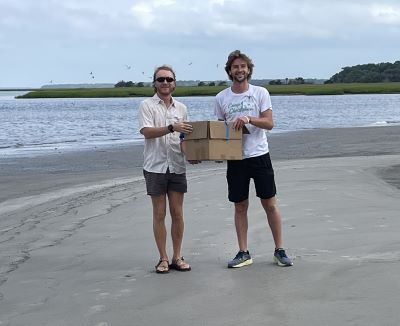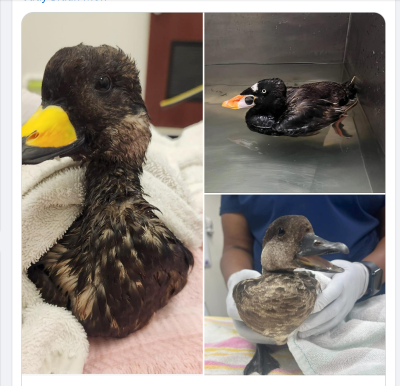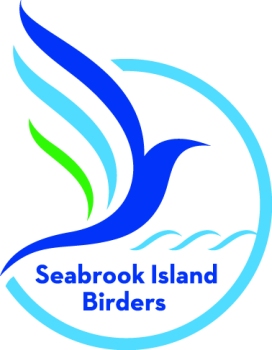On a recent morning on Turtle Patrol, members noticed a Black Scoter just sitting on the beach near Privateer Creek beyond Camp St. Christopher. Having recently seen a post on Facebook from Center for Birds of Prey, they knew what needed to be done. (The post text is copied below).
Center for Birds of Prey were contacted but they had no one available to come immediately. Their representative asked if the bird could be contained for their pick-up later in the day. Since the Turtle Patrol members were uncomfortable with the task, Camp St. Christopher was contacted to see if one of their naturalists could assist. Tyler Harris and Jared Crain from Camp St. Christopher assisted.


A representative from Center for Birds of Prey arrived at Camp shortly before noon and collected the bird. She said hopefully they would be able to release him soon further north. We wish him well.
So if you see an injured or sick Scoter, follow the instructions in the Center for Birds of Prey post below.
Facebook Post from Center for Birds of Prey

SPOTTED A SCOTER? If you have been to a South Carolina beach in the past few weeks you may have spotted a few Scoters during your visit. Black Scoters and Surf Scoters are species of diving “seaduck” that spend late fall through early spring congregating along ocean and bay coastlines feeding on abundant shellfish and mussels. As the weather warms, they migrate northward towards the cooler waters of the northern Atlantic ocean and Hudson Bay, north of Canada.
Every year some of the young and inexperienced first-year birds find themselves unable to make their northward migration due to insufficient food resources and poor feather quality / body condition. While this is a natural occurrence, this year it seems more young Scoters have had a hard time and are stranding along the Lowcountry coast.
Over the last month, we have admitted more than 50 Black and Surf Scoters to our Avian Medical Clinic. The majority of them have been: 35-50% below their normal body weight, showing signs of major feather damage, suffering from open wounds, and carrying internal parasites. Many of them have been in such critical condition that recovery was not possible. However, we have 12 currently in care that are gaining weight and regaining their waterproofing. If they fully recover, we will work with our partners in the north to release them into more seasonally appropriate habitat.
With every case we continue to gain knowledge and improve husbandry practices for these species.
Originally, there was concern that High Pathogenic Avian Influenza (HPAI) was behind the strandings, but birds that were tested were negative for the virus. We continue to gather information through advanced diagnostic tools and post-mortem necropsies in hopes to uncover more about the causes of these mass stranding events.
If you see a Scoter on one of our local beaches, please call (843) 971-7474 ext. 1 before intervening. Understand that these birds will often be in critical condition if they have stranded and that the stress of inappropriate handling can be harmful to them.
Submitted by: Judy Morr




Great information, thank you.
LikeLike
So glad for this to be posted as several folks that I have encountered have been under the impression that we should “leave them be”! Thank you!
LikeLike
This ema
LikeLike
I saw the one that was rescued on the beach. I’ve seen many more happily swimming off shore.
LikeLike